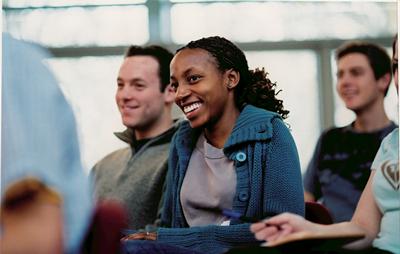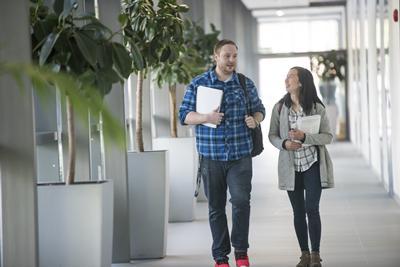Disability Support
Find out how to access long-term support for a disability or mental health condition

On this page you can find about the range of long-term and short-term wellbeing support that the University offers. You can also find our top tips and advice on how to better prepare for university life below.
The Wellbeing Team will be offering a range of targeted introductory activities throughout the Welcome period and in the first few weeks of term. Click the button below to find out more:
For students with disabilities, mental health conditions, long-term health conditions or Specific Learning Differences (SpLDs), we encourage you to make a support appointment with a member of our team. We can then discuss and explore support available to you during your time at University.
If you have evidence relating to your disability (e.g. a letter from your doctor/consultant), we encourage you to send this in to our team so that it can be reviewed and discussed in your appointment. With documentary evidence of your disability we can discuss certain types of support, listed in the boxes below.
Please do not worry if you currently have no documentary evidence of your disability. We would still encourage you to make an appointment with our team so that we can discuss the support that may be available to you.
Find out how to access long-term support for a disability or mental health condition
Arrange an Student Support Appointment to find out more about long-term disability and wellbeing support available to you
Find out how to access AERs for a disability or mental health condition
Find out how to access reasonable adjustments for a disability or mental health condition, and how these are shared with relevant teams
Find out more about mentoring either through our Student Volunteer Support Programmes or via the Disabled Students' Allowance
Our designated space for students with disabilities or long-term health conditions

Find out about external long-term support via the Disabled Students' Allowance
Find out moreThe University offers a variety of wellbeing support which is available to students without any need to provide documentary evidence. Take a look at some of the wellbeing support available below.
Book a chat or drop by to talk to a Wellbeing Advisor.
Counselling is an opportunity for you to talk to a BACP or UKCP accredited counsellor in a safe and supportive environment
Find out about the range of workshops running throughout the year, our weekly Mindful Fridays and additional groups
Tackle problems like stress, anxiety and depression in your own time and at a pace that suits you
Find out more about the Live Chat service via the Student Support Hub
Make lifestyle choices to enhance your wellbeing through offering a comprehensive range of courses
Everyone responds to change in a different way - be kind to yourself and understand that other people will be going through similar doubts and anxieties as you are. It will take time to fully adapt and to develop your coping strategies.
It is important to look after yourself physically and mentally and to engage with the five ways to wellbeing. You could:
It’s important to find the right balance between study, leisure activities and the domestic tasks associated with looking after yourself.
Remember that the pace of university is quite different to what you may be used to, and you will most likely be moving through course materials quickly, which can make you feel left behind. The expectation is that you will be completing your own reading and research in-between lectures and seminars but make sure that you do not over-work yourself. Rest breaks and leisure activities are important to ensure a healthy balance and to help maintain your wellbeing.
You can always seek help and support from your Personal Academic Tutor as well as the academic staff of each module you study.
It is not an easy thing to move away from familiarity. Ensure that you take the time to explore your new environment to ease yourself in, as long as these meet the current Government guidelines with regards to COVID-19. Check out the University's online campus tour, where you can prepare in advance to find places you will need to use. Or if you are able to, come visit the campus for yourself. We suggest finding your faculty office, the library, Student and Education Services, Student Disability and Inclusion, Student Wellbeing, the Students’ Union, shops, cafés and toilet facilities.
Making new friends can be daunting and a challenge in the first few weeks. Make sure you look after yourself and ensure you take things at your own pace. Here are a few suggestions on how to start engaging with other students:
· If you attend an on-campus lecture and sit down near someone in a lecture hall, or meet a fellow student through an online platform, why not introduce yourself and talk about how excited (or perhaps nervous) you are about beginning the course. You both have a common interest in this subject, so it is a great place to start.
· Leave your door open whilst you are occupying your room – this gives others the opportunity to have a socially distant chat with you at your door, to get to know you better.
· You could get involved in both in-person and online activities or events that interest you, such as joining a society – this is a great first way to meet people with similar interests.
· Ask your new flatmates if they’d like to go on a socially distanced walk to explore the town centre or the campus with you.
· Remember that you will be exposed to new values, beliefs and cultures than perhaps you are not used to in your home environment. Try to be open-minded and listen to others’ ideas if they differ from your own and take a genuine interest in other people’s lives.
· There can be a pressure to do well academically as well as the pressure to be sociable. Make sure that you find coping mechanisms to reduce stress levels and try not to overload yourself with social commitments near deadlines and exams.
It’s very common to feel homesick or lonely, especially if this is the first time you have lived away from home. Suddenly you are in new living and studying environments and you are away from your old friends, family and support network. Just knowing that this is normal can be a great help and you have time to think about this and discuss this with your family before you join university. Just thinking of a few strategies that might help you settle in could make a real difference. Here are a few suggestions:
· Check out our homesickness page on our website
· Depending on Government advice by the time you join university, why not offer to make your new flatmates a cuppa or make dinner together – they may be feeling homesick too
· Fill your room with familiar things from home and enjoy making this environment your own. Perhaps pin up a poster or two or some pictures of friends and loved ones
· Keep yourself nice and busy for a while – enjoy socialising safely and consider signing up to a society or pick up a new hobby you’ve always wanted to try
· Chat to a Wellbeing Advisor
· Arrange for support from a Transition Facilitator who may help you to settle into university life
· You may find yourself looking at friends’ posts on social media, which can escalate the loneliness. Remember that people usually only post the positives which can leave false impressions, so try to take social media with a pinch of salt

For further useful resources on how to better prepare yourself for university life, please check out the mental health charity Mind, via the links below:
The University cannot accept responsibility for external websites.